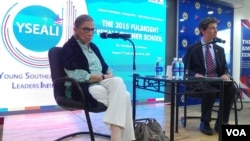For the sake of social justice, Vietnam needs judges and journalists who don’t face retaliation for handling touchy subjects, U.S. Supreme Court Justice Ruth Bader Ginsburg said this week, citing progress in her home country as a possible example.
Ginsburg, a lifetime advocate for racial and sexual equality, told an audience in Ho Chi Minh City about the “not so good old days” when the U.S. justice system didn’t protect women.
As a law student at Harvard, Ginsburg took classes in a building without a female bathroom. As a law professor at Columbia, she earned a smaller pension than male peers. Ginsburg fought those and other disparities, many of which have since been resolved in judicial courts. Things have improved, Ginsburg said, with women making up 50 percent of U.S. lawyers now, compared with 3 percent in the 1950s.
“I am very old,” the 82-year-old said, chuckling with the crowd. “When I went to law school, we had no anti-discrimination laws.”
Ginsburg said that also applied to black Americans, who attended “grossly unequal” schools until Brown v. Board of Education outlawed segregation in 1954.
But Vietnam, a former French colony, is governed by the Napoleonic Code, rather than using judicial cases to set legal precedents. The one-party country also lacks a separation of powers among the three branches of government, so judges’ rulings are seen as predetermined.
Free press a concern
Vietnam does not have an independent fourth estate either, as newspaper chiefs are generally political appointees of the communist party. Ginsburg alluded to the media after a man from the audience told her, “Many government officers often steal money from projects.” Attendees were asked to discuss Vietnam’s most pressing problems, and the man said his country needs more transparency to root out corruption.
“To achieve those solutions, wouldn’t it help if you had a free press?” Ginsburg replied. “If journalists, newspaper reporters, television reporters could speak freely without worrying about the government response?”
Ginsburg was speaking with members of the Young Southeast Asian Leaders Initiative (YSEALI), a U.S. program to build skills and relationships in the region. She fielded a hodgepodge of legal and social justice questions from the audience. One YSEALI member asked whether U.S. presidents have violated the constitution by deploying troops without a congressional declaration of war.
“If congress didn’t want the president to do what he was doing, they could have voted the other way, but they didn’t,” she said. “They were content to let the president pursue what he was pursuing.”
Almost as a sidebar, Ginsburg added, “Congress kind of likes the president to take the blame.”
The justice flew to Ho Chi Minh City from Hanoi, where she had met Prime Minister Nguyen Tan Dung, Chief Justice of the Supreme People’s Court Truong Hoa Binh, and “scholars on the rule of law,” according to a U.S. Embassy statement. Vietnam’s highest court was newly reformed in July to include just 15 deputies and associate justices, rather than the 158 judges in the past.
When asked how Vietnam could improve its legal system, Ginsburg said every country needs independent judges. The founding fathers of the United States made its top judges lifetime appointees and prohibited congress from docking their pay. That means justices don’t have to “fear” losing their jobs or salary when they issue “unpopular decisions,” Ginsburg said.
Her trip to Vietnam adds to the growing diplomatic conversation between Hanoi and Washington lately. High-level visits on both sides this year suggest the former war enemies are enjoying cozier ties than ever, on the 20th anniversary of normalized relations.




